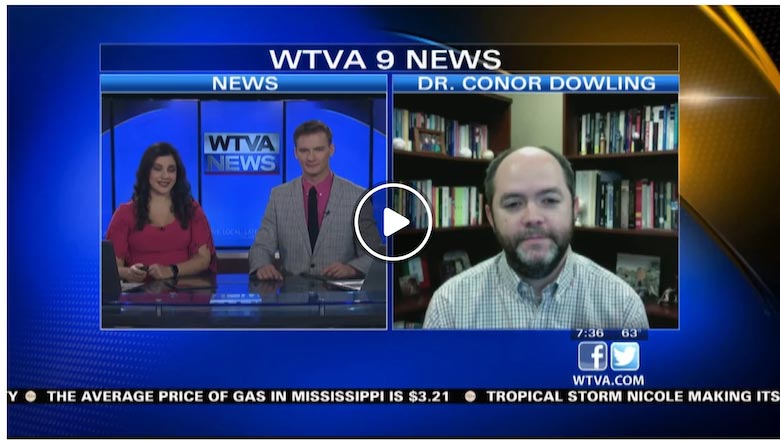UM political scientist explains what mid-term results could mean for the US
NOVEMBER 9, 2022
Conor M. Dowling, professor of political science at the University of Mississippi, joined WTVA 9 News TODAY in Tupelo to talk about what the November 8 election mid-term results could mean for the country.
What are the most significant aspects of the Tuesday midterm results?
I’d probably point to two significant aspects. First, control of the House of Representatives, as expected, is likely to shift to the Republican Party. The exact size of their majority is still up in the air, but it looks like it will end up somewhere between a 5-10 seat advantage. This was expected because with only a couple of exceptions post World War II, the party of the president loses seats—on average roughly 25 seats in House elections in the midterms. This is significant because what analysts like to refer to as “fundamental” factors—the state of the economy and approval of the president in particular, would have indicated a bigger gain for Republicans—a “red wave” if you will—in the House and it doesn’t appear that that materialized. Second, control of the Senate is still to be determined. It’s likely going to be a few days before we know the results in Nevada and Arizona as those states continue to count absentee and mail-in ballots. And Georgia may go to a runoff. Democrats look to be in a good position to hang onto control of the Senate or Republicans could end up with a one seat advantage (maybe two). Again, this is significant because it seems if the Republican Party had run some candidates who better appealed to voters they might have been able to win some more Senate seats given those fundamental factors I previously mentioned.
What do you think the midterm results may say about how voters feel about Biden’s presidency?
With respect to Biden’s presidency, the results from the midterm elections seem to indicate that voters are fairly divided over the Biden presidency. I think it’s fair to say that no one likes rising inflation, but Democrats still largely feel that their party is better equipped to handle those economic challenges whereas Republicans do not. As far as independents go, it’s a little too early to tell exactly which way they broke in this election, but it likely varied by state a great deal depending on the candidates at the top of the ticket running for Senate and/or governor.
How do you think the midterm results may change what kinds of bills and political agendas gain traction or lose momentum in Washington, D.C.?
With a divided government – a Democratic president and at least a Republican controlled House – we should expect to see less legislation passed overall. Beyond that, it’s a little too early to tell. It will likely depend—given the relatively slim majority Republicans are likely to have in the House—on how well organized and in step the party can be. We might also expect Biden to be forced to veto, or at least threaten to veto, some legislation given that it’s very unlikely either chamber would be able to override a presidential veto because they would need a 2/3 vote rather than a majority to do so.
What do you think the midterm results say about what voters see as the top issues facing the country?
Based on exit polls and other recent surveys, it seems that the economy, inflation in particular, was at the forefront of many voters’ minds. This makes sense given rising costs of goods and services, so it’s something people “feel” and directly affects them. In addition, abortion was also at the forefront of a lot of voters’ minds. And there was some party differences here, with Republicans more likely to be focused on inflation and Democrats on abortion. So, some of this focus certainly reflects messaging from candidates from those parties – with Republican candidates focusing a lot on the economy and the Biden presidency and Democratic candidates focusing on the Supreme Court’s Dobb’s decision over the summer overturning Roe v. Wade. So, we should expect those two issues to continue to be salient into next year and perhaps into the 2024 presidential election.
The interview is featured on the WTVA website, https://www.wtva.com/video/interview-ole-miss-professor-explains-what-tuesdays-mid-term-results-could-mean-for-the-u/video_20c0d38f-1cee-5863-bab7-a0b60c452a39.html
